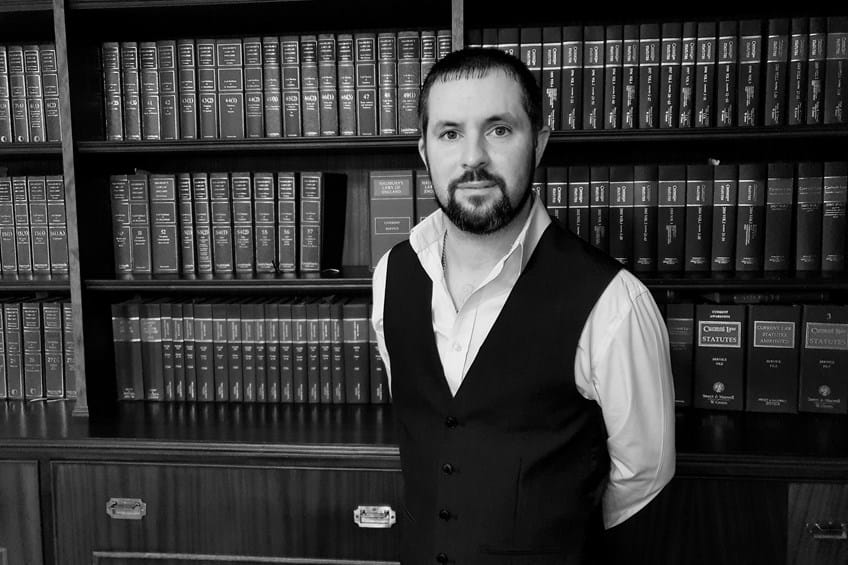General Interest News

Newly Appointed Partner
Maples Solicitors LLP are delighted to announce Chris Ayre became a Partner of the firm from 1st January 2021.
Managing Partner Mrs Anita Toal said “Chris has been a loyal member of the team since he joined us as a fresh-faced teenager and office junior many years ago. Over the years, Chris has increasingly taken on more and more responsibility and has been responsible for most of the day to day management of the firm for some time. Chris’s support of and commitment to Maples has been consistently outstanding-never more so in 2020. We hope Chris will help the firm continue to flourish for many years to come”.
Chris commented “Maples has been like a home to me for nearly 20 years so I was thrilled when the very unexpected offer of Partnership was made. 2020 was a challenging year for everyone and let’s hope 2021 can be the start of a new brighter future”.

Maples supports Alzheimer's Society's Cupcake Day
On 14th June 2018 Maples Solicitors LLP are pleased to be taking part in the Alzheimer’s Society’s Cupcake Day.
Tea, coffee and cupcakes will be served from 10:00am until 12:00pm and all donations received will go to the Alzheimer’s Society to help fight dementia and create a lasting change for all those affected by it.
At the same time, Maples will also be running a free Wills, Lasting Powers of Attorney and Care Home Planning clinic so that whilst you are in the office you may take the opportunity to discuss any of these with one of the Private Client Team with no obligation to commit. You can use the time to raise any questions you may have about making a Will, who you could appoint as Executors, whether you need a Power of Attorney, how a Power of Attorney works, or how you can plan for possible Care Home fees, for example.
Maples hope to see their existing clients join them for the coffee morning and very much look forward to meeting new people- everyone is welcome!
If you would like to discuss any matters in relation to Wills, Lasting Powers of Attorney or Care Home Planning related matters prior to the coffee morning then please contact one of the lawyers in our private client team:-
Jane Mawer- jane.mawer@maplessolicitors.com
Jamie Dobbs- jamie.dobbs@maplessolicitors.com
Faye Blair- faye.blair@maplessolcitors.com
Or telephone the office on 01775 722261 and ask to speak with one of the team.

ABH & GBH (by Georgina Maplethorpe, Student)
I am Georgina Maplethorpe, a student from Spalding High School, for my two weeks of work experience I chose to come to Maples Solicitors. I have really enjoyed my experience and I am very glad that I chose here as my placement as it has really benefitted me in many various ways. I have learnt a great deal which will then go on to help me decide whether to further my education in law and I have also had the opportunity to work with loads of friendly, helpful people and try out different jobs within the industry.
During my time at Maples Solicitors, I have had an excellent insight to experiencing the atmosphere within a police station and life in the office. While on work experience, I have learnt about different aspects of the law and in particular looked at ABH and GBH.
ABH and GBH are abbreviations for Actual Bodily Harm and Grievous Bodily Harm. I have chosen to research in more detail and write about these two offences as I have previously read a case involving them during my work experience; this is what has interested me in them.
What is ABH? ABH is committed when a person assaults another, thereby causing actual bodily harm. Bodily harm itself means, any hurt calculated to interfere with the health or comfort of the victim. The harm is not necessarily serious but it would need to be more than a shove which would remain as something known as common assault. This offence carries a maximum penalty of five years’ imprisonment and/or an unlimited fine not exceeding the statutory maximum. If someone is being charged for the first time it is unlikely that they will go to prison so a fine would be the usual outcome. Again, if the offender has previous convictions or if they were proven to have had a particular motivation for the attack, specifically if it is racially motivated this could however lead to a prison sentence.
GBH is a much more serious offence than ABH. There are two types of GBH, with intent and without intent. GBH is the unlawful and malicious wounding of a person. For this offence there needs to be really serious harm or the assault needs to have resulted in the wounding of another person. GBH without intent would result in a maximum sentence of five years and GBH with intent can in some cases result in life imprisonment but in reality sentences, over ten years are extremely rare. In the case of GBH the option of just a fine is not provided even if it is a first time offence. Also in the case of GBH it is often likely that bail will be refused due to the violent nature of the offence.
It can sometimes be difficult to determine which offence has been committed; this depends on the injuries of the victim. Another difficulty would occur when prosecuting the offender; the most common defence for these offences is one of self defence. To rely on this defence, there must have been an imminent attack and any actions used in defence must be reasonable and proportionate. There is no law that a man must wait to be struck before striking in self defence. In the event that there is no evidence of guilty mind, the charge is either reduced or dropped.

Insight into Spalding Magistrates Court
My name is Szymon Ratynski and I am a Spalding Grammar School student. As my work experience I chose to go to Maples Solicitors as I heard that here, I will be given the opportunity of going to the Court. Going to the Court has proved to be great fun as well as a great insight towards the life of Solicitors and the Magistrates. The cases were not as serious as murder but, some were assault or theft and was very interesting to me as I have always wondered what it is like in Court and to be honest I was not disappointed. The pressure and the worry is on everyone, especially the person being prosecuted as the atmosphere and procedure is very tense as they await for their sentence to be put to them.
The Procedure
As you enter the Magistrates Court there is a security check right at the entrance. If you possess a bag you will be asked to open it and show it to the security guard, and any coins or mobiles phones will be put in a tray. Then you will have to go through some sensors and if you BEEP, which you must hope not, then you will be searched. After this you sit down in the lobby and wait to be called in by someone. If you are just coming to watch and are not someone getting sentenced if the Court is already on you can go and enter quietly. Remember to bow to the Judge as that is very respectful.
When the defendant enters the Court room they will be sat on a small bench just in front of the Solicitors and the Magistrates The person will be prosecuted and the charges read out and if they have a solicitor, they will defend them. Of course a person guilty can represent themselves in Court if they want to.
If the defendant makes an early guilty plea this will usually end up with the sentence being less severe. I have really enjoyed my time in Court and I now know how everything runs. Now I know that this is the career I want to take on and become a solicitor. The best part in Court, in my opinion is when the solicitor of the defendant speaks as they have to point out the smallest details, because every detail can help the guilty decrease his sentence. In the Magistrates Court most sentences ended up with Community working hours and fines. I have also noticed that the bigger the persons wage the bigger the fine will be as different sums effect different people! Although the Solicitors can affect the sentence the Magistrates have the last say, so regardless of what you feel what the Magistrate says goes. In the near future I hope to end up in Court but not as a guilty person getting sentenced but, as a Defence Solicitor!
At the end the Defendant will be asked to go wait in the waiting room for the paper work to be done. They will then sign of some sheets and documents and go and serve the sentence and pay fines. They will be asked to return to Court after a certain time if they still have not paid the fines or completed e.g. Community hours. Some cases in the Court can be moved to a later date if the person charged is foreign and cannot speak English to an understandable level. As they will need the help of and interpreter.

Anti-Social Behaviour by Paige Williamson
I am Paige Williamson, a student of the University Academy Holbeach, and I have chosen to do my 2 weeks work experience at Maples Solicitors LLP, at Spalding. I chose this placement to decide whether I wanted to further my education in Law. Maples have given me a good insight on the everyday life in the Law industry.
I have learnt about various aspects of the law and in particular I have considered the law relating to Anti-social behaviour because the government is currently considering changes to this area of law.
Anti-social behaviour is a term for an incident or accident that is affecting how others live their lives. Anti-social behaviour includes things such as bullying, vandalism, intimidation, nuisance of the public – such as neighbours.
New actions can now be made to try and resolve the problems that youths cause amongst the public. If the Police have evidence that someone is acting in an inappropriate manner and causing problems for the community they may ask that person to sign a behaviour contract- also known as an ABC (acceptable behaviour contract). These contracts can be given to anyone despite their age. These contracts are voluntary ones that are hand-written that states a person can no longer be in certain areas or be around certain people. It is not a criminal record so therefore will not be used against them if they was to be prosecuted for any offence and would not be used as evidence against them.
When the person signs this contract they agree to stop the anti-social behaviour and they might also be asked for instance to attend school or college and sometimes even regular counselling sessions.
The contract usually consists of 6months and the person is carefully guarded to ensure that this contract isn’t broken. If the contract was to be broken further action might be taken on the offender. The contract may be extended or a use of an Anti-social behaviour order (ASBO) will be permitted.
ASBO’s are usually given if a person over the age of 10 has committed a number of anti-social offences. This contract stops the offender going into certain areas or being around and spending time with certain people. The ASBO lasts approximately 2years, depending whether all conditions are lived up to and no other offence is committed. If no other offences are committed and there is an improvement on behaviour of the person some conditions may be lifted to allow more freedom of the offender. Should the conditions be broken then the order could be increased and the courts could imply a criminal record to that person for breaking it- this is a criminal offence. They may be arrested for this and their case will be heard in court. If the person is prosecuted their sentence will depend on their age and how serious the offence was.
The Government is now testing and introducing a new order to replace ASBO’s. The new order is named, Criminal Behaviour Order (CBO). It works by any anti-social behaviour being reported directly to the police by a minimum of 5 people, the Police with have a mandatory duty to investigate the reported incidents. This is referred to as the ‘community trigger’. CBO’s will give the police the option of applying to the courts for an order to stop and prevent anymore anti-social behaviour- this is described as ‘low level nuisance’. The CBO, after conviction, would allow the courts to restrict individuals from engaging in certain activities or being present in certain areas or places. If they were in breach of this order they could receive a maximum of 5year imprisonment. These new orders can be applied in a matter of days or even hours- where as ASBO’s are said to take to long to enforce on the offender.
Also proposed to replace the ASBO is an order called Crime Prevention Injunctions, (CPI). It works by the court knowing that the individual has engaged, will engage or engaging into anti-social behaviour to one or more persons. Any evidence would be permitted and the use of witnesses to prove the behaviour is not acceptable. The injunction would include prohibitions on the offenders’ future behaviour and may also include positive requirements to rule out the issues of the reason for the behaviour and any underlying problems the individual may have. There are currently disputes as to whether this order should be enforced in the Magistrates court or whether it should only be applied to an offender in the county courts.
If the offender was in breach of this order, it is not considered a criminal offence but will need to be proved that it was ‘beyond reasonable doubt’. Breach of the injunction would usually be treated as contempt of court. If the CPI is heard in the County Court, it would be proposed that over18’s would be treated as if in contempt of court. However, if the CPI is heard in the Magistrates’ Court, specific sanctions for the breach would be enforced, such as fines and a maximum sentence on 6months. The sanctions would be civil sanctions and with no criminal conviction resulting the breach.
For under18’s, the matter would not be dealt with through contempt of court because they are unable to detain anyone under 18 for contempt and fines are hard to enforce. Therefore alternative sanctions would be required and that would be decided at the county court or the youth court.
Another way of dealing with anti-social behaviour is by enforcing Dispersal notices. Police officers may restrict people from certain areas where there is a high amount of anti-social behaviour being permitted. This means that once it is a dispersal area, police and community officers could ask any group of people to leave the area if they feel like an offence might be committed by them- they can also tell them that they mustn’t return to that area for a period of 24hours. Officers also have the power to ask any under16’s to leave the area after the time 9.00pm. If they refuse to leave they are committing an offence, and may be warned or possibly arrested depending on the refusal manner.
Officers will not bother you if you are just passing through a dispersal area or if they believe that you are highly unlikely to commit any type of offence. This will apply to all members of the public.

Maples Solicitors Recognised!
We are proud to announce that recently the firm has been successful with its application to the Law Society to become a member of the CQS.
The membership of the CQS recognises the high quality standards that our team of Solicitors apply when dealing with your residential property transactions.
Mike Pepper, head of our Residential Conveyancing Department says:-
“This is recognition of the firm’s adherence to high practice management standards and to prudent and efficient conveyancing procedure. Our clients can be rest assured that they will get great service from us when dealing with their house sale and/or purchase.”
If you are buying or selling a property, then please contact Mike Pepper on 01775 722261, or email mike.pepper@maplessolicitors.com or write to us at 23 New Road, Spalding, Lincolnshire PE11 1DH.



